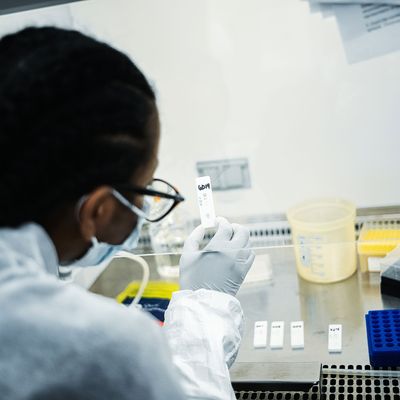
We’re committed to keeping our readers informed.
We’ve removed our paywall from essential coronavirus news stories. Become a subscriber to support our journalists. Subscribe now.
For weeks, COVID-19 antibody tests have been invoked as a technology that would finally allow us to see what we’re up against. Last week, Dr. Anthony Fauci told the Today show that several versions of the blood test — which could reveal whether someone has been exposed to the coronavirus, whether or not they have had symptoms — had been developed and would be available in “days to weeks.” More than 90 antibody tests are on the market already, and one has been authorized by the FDA.
“It is likely — though we need to prove it — that once you’ve been infected, and you have an antibody profile, that you are very likely protected against subsequent challenge to the same virus,” Fauci said on Today. “Which means you may have a cohort of people who are actually protected, who have more of a chance of getting back into the normality of society.”
According to one widely discussed vision for reopening society — the one that Fauci seemed to be gesturing to — the antibody tests (also known as serology tests) could be the key to getting an “immunization passport.” That document would stand as proof that the holder is not an infection risk for coronavirus, and possessing it might allow one to go back to work, hug their elderly parents, take public transit, or enter bars and restaurants. (Areas restricted only to people holding the passports are sometimes referred to as “green zones” by proponents of the idea.) In a world of immunity passports and green zones, people being awarded a positive antibody test would amount to their suddenly possessing a superpower — if perhaps a temporary one — guarding them against infection in the midst of a global pandemic. While the notion of these blood-test-based documents (or “certificates of immunization,” as Fauci called them) may at first sound like science fiction, the idea has already been considered in Germany, the U.K., and Italy.
But like so many other parts of the larger coronavirus story, this one is shrouded in uncertainty — to the point where, as we learn more about the disease and the human immune system’s response to it, the plan Fauci was presenting as a source of hope may not prove workable at all. Even apart from the complexity of implementing such a system, experts say developing a precise and accurate antibody test actually proving that a person is immune to the virus may take as long as developing and distributing a vaccine. “I think that’s going to take us, pretty much, through the next year to be able to understand what the protection is, and how long we can see that last will probably take years for that to happen,” Centers for Disease Control and Prevention director Dr. Robert Redfield told NBC News on Monday. The reason it will take so long is the same reason a vaccine can’t be developed sooner: The science is still unclear.
“The bottom line is there is a lot that remains unknown about antibody responses and immunity to COVID in general,” said Angela Rasmussen, a virologist at Columbia University. (Even if researchers were to make great strides in the coming months and nail down an effective test, Rasmussen worries passports could be forged or provide people with a false sense of security.)
Here’s what researchers do know: Five to ten days after being exposed to COVID-19, our bodies develop antibodies that bind to proteins found on the virus. At first, a generic antibody (IgM) punches in to battle the virus before tapering off after only a few weeks. The immune system eventually refines immunoglobulins to produce two new antibodies, IgG and IgA, which are custom-tooled to bind to SARS-CoV-2. IgG will remain in the bloodstream indefinitely and could potentially provide immunity for months or longer. For context, other coronaviruses that are responsible for the common cold produce antibodies that may last months. Antibodies produced to bind with SARS-CoV-1, which causes SARS and is very similar to COVID-19, can last up to three years.
The most pressing problem is that antibody tests, for now, aren’t very good. “The first step to figuring out immunity in the community is having a good test that performs well — if it’s positive, it’s most likely truly positive; if it’s negative, it’s most likely truly negative,” said Dr. Natasha Chida, an infectious-disease expert at Johns Hopkins Medicine. Tests may scan for the wrong antibodies, instead identifying antibodies that fight the common cold, or false positives, which would allow people without antibodies to get immunization passports. “As far as we know, the tests that have been developed are not good enough for clinical decision-making yet,” Chida said.
Because the research is moving at breakneck speed, antibody-test developers are not working on solid ground. For example, they still don’t know for certain if IgG is the key to fighting off COVID-19. Immune responses are complicated and other factors, like T cells, may be responsible for beating back the disease. “Having an antibody response doesn’t necessarily mean a good antibody response,” said Dr. Yukari Manabe, associate director of global health research and innovation at Johns Hopkins Medicine. “Everyone is hoping that an IgG response equals neutralizing immunity. But the number of papers that have actually shown that are not very many.”
If IgG is the right antibody for the job, there are other variables that need to be filled in before immunization passports can be issued. Two recent studies challenged the assumption that post-infection immunity is static and widespread across the population. In a preliminary study of 175 coronavirus patients who had recovered from coronavirus in Shanghai, nearly one-third did not have enough antibodies to confer immunity. And, over the past week, South Korea’s Centers for Disease Control and Prevention reported that 116 patients who had recovered from coronavirus have tested positive again, citing reactivation rather than reinfection. Asked about these studies, experts said both should be treated with a healthy amount of skepticism — “Not all tests are created equal,” said Chida — but, at the very least, they show just how little scientists can definitively say about COVID-19.
Even if, in the end, antibody tests don’t lead to individual immunity passports, an accurate serological test will give public-health officials a clearer picture of the second wave. Assuming antibodies do confer some window of immunity, the more people who test positive for antibodies, the more confident officials can be in lifting social-distancing measures for large swaths of the population. We don’t know what percentage of the population would need to test positive to achieve herd immunity. Highly communicable diseases, like measles, require 90 percent of the population to be immune; COVID-19 is considerably less contagious but would still likely need at least 70 percent of the population to be immune before herd immunity would kick in.
On an individual basis, serological tests may allow vulnerable hot spots like ICUs and elder-care facilities to screen staff members for antibodies as they prepare for the virus next fall and winter. “You would think there has to be a proportion of people who have neutralizing immunity for at least six months,” said Manabe. “But there are going to be people who are going to get it again potentially, and there are going to be people who didn’t actually see it the first time because they did a really good job social distancing. It’s going to be important to be vigilant through this next flu season. Remember, 1918 was worse than 1917.”






























